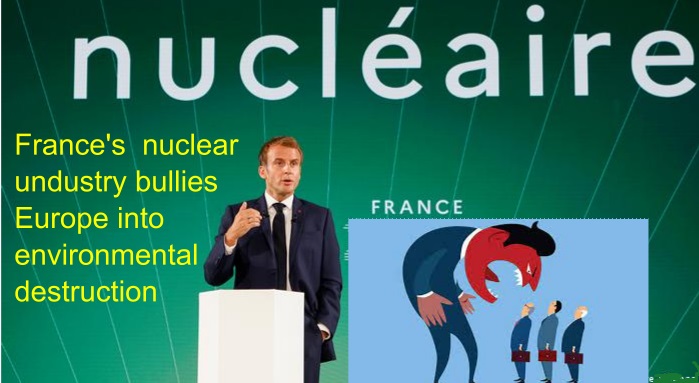EU states back nuclear energy while diluting biodiversity reforms.

Concessions follow a heated political fightback by France against Brussels’ green agenda
Ft.com Alice Hancock in Brussels 16 June 23
EU countries have backed more allowances for nuclear energy and the weakening of a law to protect biodiversity amid an increasingly heated fightback against Brussels’ green agenda. Following months of French pressure to gain more recognition for its nuclear industry, EU ambassadors on Friday approved a declaration that puts “other non-fossil” energy sources on a par with renewables in efforts to decarbonise.
Germany, Austria and Luxembourg were among member states who had opposed recognising “low carbon” energy sources such as nuclear in the EU’s rules on renewable energy, fearing that it could detract investment away from other options such as wind and solar power. But France’s threat to block approval of the EU’s renewable energy targets forced the European Commission to put forward an additional declaration that acknowledges the role of nuclear, which Germany finally back
The document said that the commission “acknowledges that other sources of fossil-free energy than renewable energy contribute to reaching climate neutrality by 2050 for member states who decide to rely on such sources of energy”. France and Germany were also among a majority that supported heavy revisions to Brussels’ flagship law to restore damaged ecosystems, allowing national governments far more leeway in applying the reforms.
The Nature Restoration Law was initially envisaged by the commission as a way to protect and restore landscapes in Europe that had been degraded through years of pollution or heavy agricultural use. It should also ensure that the bloc meets its international commitments, agreed at the COP15 biodiversity conference last year, to restore and conserve 30 per cent of the world’s ecosystems.
The commission’s original proposal that countries should restore 30 per cent each of six different kinds of habitat including wetlands and forests that were in poor condition by 2030 has been reduced to a target of 30 per cent across all ecosystems. To placate densely populated countries such as the Netherlands, countries would no longer need to prevent healthy habitats from deteriorating but rather to “endeavour to put in place, where possible” the necessary measures.
The proposal has also been controversial in the European parliament where lawmakers were forced to delay a highly charged vote on the law on Thursday after running out of time to go through more than 2,000 proposed amendments.
Conservative politicians have made a concerted campaign to squash the regulation claiming that it would lead to higher food prices and increased costs for farmers and fishermen, as political groups begin to jostle for attention ahead of European elections next year.
The topic became so heated in the run-up to Thursday’s vote that the European People’s party, the largest group in the parliament and political family of the former German chancellor Angela Merkel, accused the commission of blackmailing MEPs to support the law…………………………
The parliamentary committee will finish voting on June 27. Ministers are expected to endorse EU member states position on Tuesday though several diplomats said that it could be a tight vote. https://www.ft.com/content/ee8cfeb4-4c33-4f83-ad64-6b009ab5083a—
No comments yet.
-
Archives
- February 2026 (66)
- January 2026 (308)
- December 2025 (358)
- November 2025 (359)
- October 2025 (376)
- September 2025 (258)
- August 2025 (319)
- July 2025 (230)
- June 2025 (348)
- May 2025 (261)
- April 2025 (305)
- March 2025 (319)
-
Categories
- 1
- 1 NUCLEAR ISSUES
- business and costs
- climate change
- culture and arts
- ENERGY
- environment
- health
- history
- indigenous issues
- Legal
- marketing of nuclear
- media
- opposition to nuclear
- PERSONAL STORIES
- politics
- politics international
- Religion and ethics
- safety
- secrets,lies and civil liberties
- spinbuster
- technology
- Uranium
- wastes
- weapons and war
- Women
- 2 WORLD
- ACTION
- AFRICA
- Atrocities
- AUSTRALIA
- Christina's notes
- Christina's themes
- culture and arts
- Events
- Fuk 2022
- Fuk 2023
- Fukushima 2017
- Fukushima 2018
- fukushima 2019
- Fukushima 2020
- Fukushima 2021
- general
- global warming
- Humour (God we need it)
- Nuclear
- RARE EARTHS
- Reference
- resources – print
- Resources -audiovicual
- Weekly Newsletter
- World
- World Nuclear
- YouTube
-
RSS
Entries RSS
Comments RSS

Leave a comment